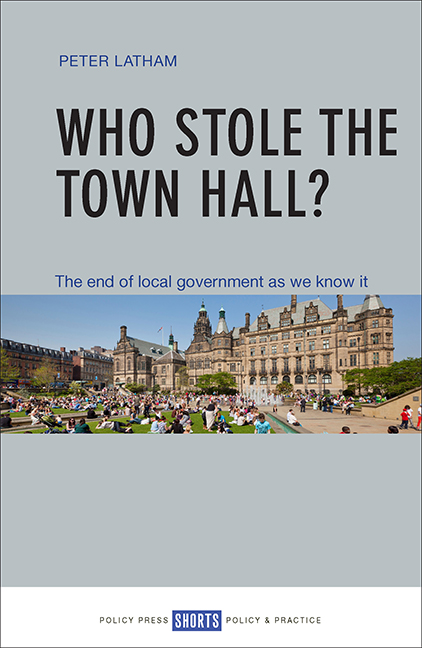Book contents
- Frontmatter
- Dedication
- Contents
- List of tables
- Acknowledgements
- Foreword
- About the author
- List of abbreviations
- Introduction
- 1 The Localism Act, Open Public Services and the neoliberalisation of councils
- 2 Imposed ‘metro’ mayors: new wine in old bottles
- 3 Police and Crime Commissioners: another ‘half-baked import’
- 4 Local government finance
- 5 Towards a new basis for federal, regional and local democracy
- References
- Index
Foreword
Published online by Cambridge University Press: 05 April 2022
- Frontmatter
- Dedication
- Contents
- List of tables
- Acknowledgements
- Foreword
- About the author
- List of abbreviations
- Introduction
- 1 The Localism Act, Open Public Services and the neoliberalisation of councils
- 2 Imposed ‘metro’ mayors: new wine in old bottles
- 3 Police and Crime Commissioners: another ‘half-baked import’
- 4 Local government finance
- 5 Towards a new basis for federal, regional and local democracy
- References
- Index
Summary
Developing and updating the themes of his previous publication The State and Local Government, the author's new book is welcome and timely not only for the second decade of the century, but for many years to come. The issues and problems examined are not to be resolved easily or quickly, as the last 35 years have proved.
The power of big business and its corrosive anti-democratic and profiteering ways are a huge and continuing challenge. By shining the torch of scholarly, painstaking research and analysis, evidential ammunition and hope is here given to any who care to read or dip into Who Stole the Town Hall?.
Local government as a key democratic institution is on its knees. The number of citizens, especially the young, voting (or rather not voting) in council elections is a potent omen. It betokens not only a lack of political education and understanding by and of the electorate, but the distrust, exasperation and anger at the parlous position of local politics and of politicians at all levels.
Lack of service provision, its quality or frequency, and clear postcode and other inequalities, cause disorder, distress and huge anger. Millions are facing inexcusable difficulties and poorer life chances.
Peter Latham's keen analysis nails the reasons for this dreadful situation from the context of his long experience and from his Marxist standpoint, and he makes positive if sometimes necessarily controversial proposals for corrective action.
His intense and wide reading is stamped on each page. He really has done the work for his readers. There are extensive quotations and clear statistics, all underscoring the current state of local government; how we arrived at it; whether or not it can continue as it is; what are the engines of change; and, importantly, what the people can do to make things change for the better.
The book lays bare the purpose and manipulations of the new laws which the Tory-led Coalition government introduced. They encourage municipal burglary and enrich both domestic and international corporate interests at the majority's expense; but neither does the author spare the New Labour years from cogent criticism.
- Type
- Chapter
- Information
- Who Stole the Town Hall?The End of Local Government as We Know It, pp. viii - ixPublisher: Bristol University PressPrint publication year: 2017



